|
|
|
Sort Order |
|
|
|
Items / Page
|
|
|
|
|
|
|
| Srl | Item |
| 1 |
ID:
123843
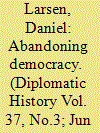

|
|
|
|
|
| Publication |
2013.
|
| Summary/Abstract |
Through an examination of American policy toward Germany during late 1918 to 1919, this article challenges widely held ideas about the attitudes of American President Woodrow Wilson toward democracy promotion. Scholars typically have seen in Wilson's foreign policy the antecedents of several subsequent U.S. presidents' policies of democracy promotion and democratic interventionism. This study contends that at least during the second half of Wilson's presidency, however, Wilson did not regard it as appropriate for the United States to intervene in the internal political affairs of other nations to promote democracy. While he hoped that postwar Germany would come to embrace democracy, he believed that the Germans would have to find democracy on their own. Despite the fact that those American diplomatic officials who were most familiar with the situation in Germany continually urged a more active U.S. policy to promote democracy there, Wilson remained deeply skeptical of the new German government and adhered firmly to the view that the United States should refrain from attempting to influence Germany's internal political affairs.
|
|
|
|
|
|
|
|
|
|
|
|
|
|
|
|
| 2 |
ID:
155790
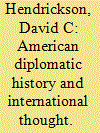

|
|
|
|
|
| Summary/Abstract |
This essay offers a constitutional perspective on the American encounter with the problem of international order. Its point of departure is the American Founding, a subject often invisible in both the history of international thought and contemporary International Relations theory. Although usually considered as an incident within the domestic politics of the United States, the Founding displays many key ideas that have subsequently played a vital role in both international political thought and IR theory. The purpose of this essay is to explore these ideas and to take account of their passage through time, up to and including the present day. Those ideas shine a light not only on how we organize our scholarly enterprises but also on the contemporary direction of US foreign policy and the larger question of world order.
|
|
|
|
|
|
|
|
|
|
|
|
|
|
|
|
| 3 |
ID:
107059
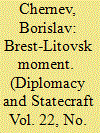

|
|
|
|
|
| Publication |
2011.
|
| Summary/Abstract |
The article argues that the historical origins of the concept of self-determination had less to do with Woodrow Wilson than with the specific circumstances during the last phase of the Great War. It argues that self-determination became the "centre of the discourse of legitimacy in international relations" as a result of a dynamic process involving multiple actors. Lenin and the Bolsheviks first started to employ the concept. Self-determination discourse gained further momentum during the Brest-Litovsk peace conference, where the Austro-German and Russian delegations debated its application at some length. This prompted Allied statesmen to crystallise their ideas and make self-determination their principal war aim. The increasing appeal of self-determination first manifested itself in the entangled spaces of Eastern Europe, where the national aspirations of Poles and Ukrainians, bolstered by the new discourse, converged with the rhetoric emanating from Brest-Litovsk to create a "Wilsonian moment" before Wilson.
|
|
|
|
|
|
|
|
|
|
|
|
|
|
|
|
| 4 |
ID:
114152
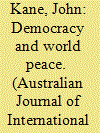

|
|
|
|
|
| Publication |
2012.
|
| Summary/Abstract |
When liberal democracies pursue idealistic goals they invite accusations of naivety and impracticality; if they act on strictly realistic premises they are accused of hypocrisy or betrayal of ideals. The author explores the consequences of this idealism-realism dilemma using the example of United States foreign policy and the particular case of Woodrow Wilson and the Covenant of the League of Nations. The author examines its theoretical roots by analysing the work of Immanuel Kant, who laid down the influential moral-political ideal of a democratic peace but posited so stark a theoretical gulf between morality and politics as to make the ideal seem unreachable. Kant tried to show how a world resistant to morality might nevertheless evolve towards one in which moral action had real political effect-a necessary condition, he believed, for an international federation of republics committed to peaceful coexistence. The implausibility of his account reveals the problematic nature of the idealism-realism divide, but also, in its attempt to bridge that divide, points the way towards a genuinely ethical-practical foreign policy founded in political prudence.
|
|
|
|
|
|
|
|
|
|
|
|
|
|
|
|
| 5 |
ID:
106824
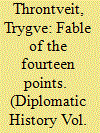

|
|
|
|
|
| Publication |
2011.
|
| Summary/Abstract |
For decades, scholars have turned to Woodrow Wilson's Fourteen Points address of January 8, 1918, to explain his vision for a new international order after World War I. And for decades, one particular phrase has been closely linked to that vision: "self-determination." The phrase, however, appears nowhere in Wilson's address. Moreover, it is often shorthand for "national self-determination," connoting an ethno-nationalist political ideal Wilson never held. Rather, Wilson idealized self-government: the right of all to help direct their society's public affairs. By 1918, Wilson sought to promote both national and international self-government through a deliberative League of Nations, equipped to accommodate changes in an increasingly interdependent global society. Prejudiced though he was, Wilson envisioned an egalitarian League, with adequate sovereign powers to advance justice within and among nations. Though Wilson poorly communicated this radical yet pragmatic ideal, it was his late abandonment of pragmatic compromise that prevented U.S. League membership. That outcome, despite its contingency, has limited American views of the nation's global role ever since.
|
|
|
|
|
|
|
|
|
|
|
|
|
|
|
|
| 6 |
ID:
108275
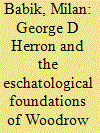

|
|
|
|
|
| Publication |
2011.
|
| Summary/Abstract |
This essay seeks to demonstrate the eschatological foundations of Woodrow Wilson's foreign policy during and after World War I through his neglected relationship with George D. Herron, a millennialist theologian and one of the leaders of the Kingdom Movement in American Protestant Christianity. After a brief synopsis of Herron's life and teachings, it provides a detailed exposition of his eschatological reading of the Great War and America's role in it: Herron portrayed the conflict as the final battle between Christ and Satan, Wilson as a divinely appointed messiah, and the League of Nations as the secular fulfillment of the Kingdom of God. Subsequent sections trace the relationship between Herron and Wilson through their correspondence and reveal that the president repeatedly endorsed Herron's interpretation as expressive of his own views. The conclusion reflects on some of the main implications of Wilson's relationship with Herron for the theory and practice of liberal internationalism then and now.
|
|
|
|
|
|
|
|
|
|
|
|
|
|
|
|
| 7 |
ID:
124184


|
|
|
|
|
| Publication |
2013.
|
| Summary/Abstract |
Between 1913 and 1917, Colonel Edward House, President Woodrow Wilson's closest friend and advisor, undertook several missions to Europe. Serving to shape House's attitude to American neutrality, House's advice deriving from these trips was extremely influential upon Wilson's foreign policy. This analysis examines the influences on House's advice, arguing that his pro-Allied stance evolved during this time and influenced Wilson's ultimate decision to have the United States enter the war on the Allied side. The primary influence on House's attitude was his relationship with British foreign secretary, Sir Edward Grey. Several factors drew the two men together. They meshed with House's pre-existing views on global geopolitics expressed in his novel, Philip Dru. Previous scholarship that has investigated House's trips to Europe tends to gloss over the intricacies of the House-Grey relationship. Whilst the two men shared a close friendship, examination of their correspondence and the observation of others suggests that Grey's diplomatic goal was to establish close Anglo-American relations, and that a close connexion with House furthered that aim. This connexion re-enforced House's pro-Allied attitude that, in turn, contributed to America's entrance into the war.
|
|
|
|
|
|
|
|
|
|
|
|
|
|
|
|
| 8 |
ID:
155900
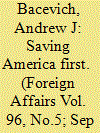

|
|
|
| 9 |
ID:
103113
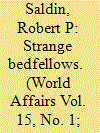

|
|
|
| 10 |
ID:
149372
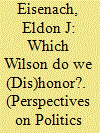

|
|
|
|
|
| Summary/Abstract |
Woodrow Wilson is the only American political scientist to have served as President of the United States. In the time between his political science Ph.D. (from Johns Hopkins, in 1886) and his tenure as president (1913–21), he also served as president of Princeton University (1902–10) and president of the American Political Science Association (1909–10). Wilson is one of the most revered figures in American political thought and in American political science. The Woodrow Wilson Award is perhaps APSA’s most distinguished award, given annually for the best book on government, politics, or international affairs published in the previous year, and sponsored by the Woodrow Wilson Foundation at Princeton University.
|
|
|
|
|
|
|
|
|
|
|
|
|
|
|
|
| 11 |
ID:
095110
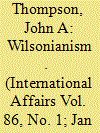

|
|
|
|
|
| Publication |
2010.
|
| Summary/Abstract |
Americans have generally seen the principles and objectives proclaimed by President Woodrow Wilson during the First World War as having continued relevance for United States foreign policy. However, they have often differed over their application to specific situations, particularly because there is likely to be a tension between a drive to establish democratic values across the globe and commitment to a universal system of collective security. Rather than seeking a pure, abstract definition of 'Wilsonianism', it is more illuminating to examine its origins and evolution in relation to the development of American foreign policy over the years. Tracing this historical process reveals that Wilson committed himself to a postwar league of nations during the period of American neutrality, but it was only as the United States became a belligerent that the spread of democratic government became a policy objective, and then only in a partial and qualified way. A similar pattern has been discernible in subsequent decades. It has been during conflicts, or the run-up to them, that the more ideological and revisionist aspects of Wilsonian principles have come to the fore, whereas it has been in the aftermath of conflicts that there has been the greatest interest in the potentialities of a universal collective security organization. There has also been a broad shift of emphasis over time. As confidence in America's power position has grown, the core of Wilson's legacy has more often come to be seen as the promotion of democracy rather than the strengthening of international institutions. The persistence of both themes may be seen as reflecting basic and enduring elements of the policy-making context-on the one hand, the interests of the United States as a status quo power, and on the other, the demands of domestic American opinion.
|
|
|
|
|
|
|
|
|
|
|
|
|
|
|
|
| 12 |
ID:
074731
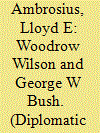

|
|
|
| 13 |
ID:
162043
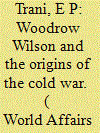

|
|
|
| 14 |
ID:
187237
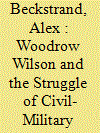

|
|
|
|
|
| Summary/Abstract |
The 1916–1917 Punitive Expedition by the United States into Mexico had two initial goals: dispersing the bands of Pancho Villa and improving border security. While historians have debated the outcome of the campaign, this article argues that the expedition failed, primarily because of President Woodrow Wilson’s conduct of civil-military relations. Throughout the Punitive Expedition, Wilson deferred too much to his military commanders, namely Major General Frederick Funston and Brigadier General John J. Pershing. He needlessly extended the U.S. presence in Mexico and failed to link policy aims to the use of military force.
|
|
|
|
|
|
|
|
|
|
|
|
|
|
|
|
| 15 |
ID:
095321
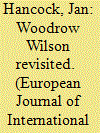

|
|
|
|
|
| Publication |
2010.
|
| Summary/Abstract |
The George W. Bush Administrations presented foreign policy in terms of universal liberal values, including human rights. This has led to a number of scholastic comparisons being drawn with the foreign policy of Woodrow Wilson. This article seeks to contribute to this debate by identifying and accounting for three internal rules common to the human rights discourse expressed by the Wilson and Bush Administrations. Bush is argued to indeed be an inheritor of the Wilsonian legacy but not because the Administrations were characterized by the naive advocacy of idealistic values. Instead, human rights have been discursively co-opted by both Presidents as a technique of governance in the sense of producing reality by insisting on one specific interpretation of identities and intents.
|
|
|
|
|
|
|
|
|
|
|
|
|
|
|
|
| 16 |
ID:
148086


|
|
|
|
|
| Summary/Abstract |
This article wrestles with the question: could there have been something in the Woodrow Wilson presidency that remains germane to the continuing debate about whether the United States and its Western allies “lost” Russia following the ending of the Cold War and disappearance of the Soviet Union?
|
|
|
|
|
|
|
|
|
|
|
|
|
|
|
|
| 17 |
ID:
162830
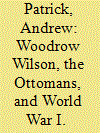

|
|
|
|
|
|
|
|